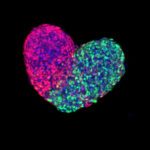Link to Pubmed [PMID] – 32191693
Link to DOI – 10.1371/journal.pbio.3000642
PLoS Biol 2020 03; 18(3): e3000642
Loners-individuals out of sync with a coordinated majority-occur frequently in nature. Are loners incidental byproducts of large-scale coordination attempts, or are they part of a mosaic of life-history strategies? Here, we provide empirical evidence of naturally occurring heritable variation in loner behavior in the model social amoeba Dictyostelium discoideum. We propose that Dictyostelium loners-cells that do not join the multicellular life stage-arise from a dynamic population-partitioning process, the result of each cell making a stochastic, signal-based decision. We find evidence that this imperfectly synchronized multicellular development is affected by both abiotic (environmental porosity) and biotic (signaling) factors. Finally, we predict theoretically that when a pair of strains differing in their partitioning behavior coaggregate, cross-signaling impacts slime-mold diversity across spatiotemporal scales. Our findings suggest that loners could be critical to understanding collective and social behaviors, multicellular development, and ecological dynamics in D. discoideum. More broadly, across taxa, imperfect coordination of collective behaviors might be adaptive by enabling diversification of life-history strategies.

